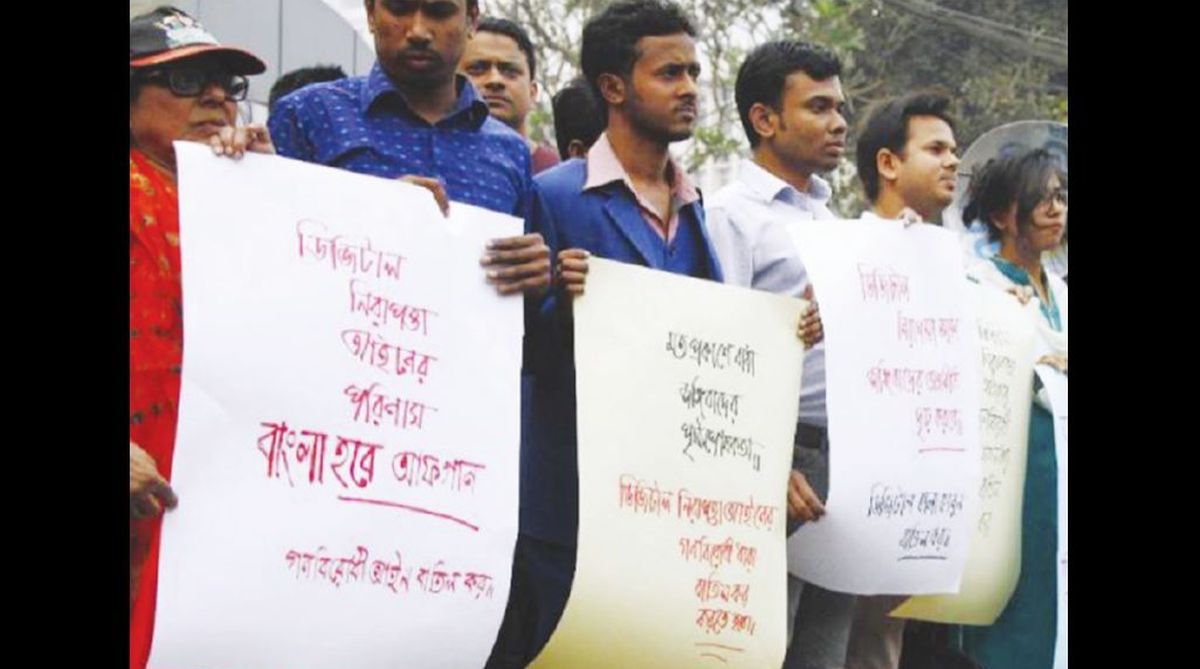On September 19, Bangladesh passed the latest iteration of its digital policy. Telecommunications and Information Technology Minister Mustafa Jabbar, who proposed the Digital Security Bill 2018 to the parliament, called it a “historic” and “heavenly” law, compared to digital laws in other countries. He also made a cryptic reference to a “digital war” in the future. “If we cannot protect the nation during this war, and if it endangers the state, the fault will be ours,” he said.
The official interpretation of what the law is and what it means for the country is, however, diametrically opposed to the one given by journalists and rights defenders, who have expressed their frustrations over the provisions of the law and rejected in no uncertain terms the ruling Awami League’s rhetoric of state security. Both groups have said that the law contradicts the basic principles of the constitution and poses “serious threats” to freedom of speech, undermining independent journalism.
Advertisement
Universally, social media has emerged as a major cause for concern— and increasingly so because of its susceptibility to fake news and toxic dialogue. This is a problem that Bangladesh knows well. But the current debate is not so much about the authenticity of the news and views shared online as it is about the right to share or publish them. It’s about the rationale for putting restrictions on a platform once championed as the “people’s platform” that gives a voice to the voiceless.
Rights campaigners say that the new law, with its vague, open-ended terms and unreasonably harsh punishments, is not an answer to the “crimes” that it purports to check. For one, it gives unlimited power to the police, which can be used to punish critics ahead of the upcoming election. In a section-by-section analysis of the law, the Editors’ Council, an association of 20 newspaper editors, called for a critical rethink of eight of the sections they fear will lead to the erosion of press freedom, “policing media operations, censoring content and controlling media freedom and freedom of speech and expression as guaranteed by our constitution.”
Additionally, due to the inclusion of the provisions of the colonial-era Official Secrets Act, the law will undermine the objectives of the Right to Information Act, according to Jyotirmoy Barua, a Supreme Court lawyer and activist. “As a result, people will go into further self-censorship,” he said.
To outsiders, the Awami League’s attempt to control social media might seem strange. Why would a party want to restrict the free flow of news and opinions in the digital sphere when it has built its entire campaign around the promise of building a “Digital Bangladesh”? And yet anyone familiar with the party’s activities in recent years knows that the latest law is just an extension of its policy of intolerance against critical views, which usually goes into overdrive before elections.
Previously, section 57 of the ICT Act, of which the latest law is a successor, had earned notoriety as a tool to stifle dissent. Hundreds have been prosecuted under the act since late 2013, when it was amended to increase punishment for offenders and give power to police to make arrests without a warrant. The amendment came just before the 10th national parliamentary election, held on January 5, 2014. It’s hardly a coincidence that another draconian law has been passed just before the 11th national parliamentary election, which will take place towards the end of December or early next year.
Apparent in the manner in which unreasonable restrictions are being put on social media is a deep-seated fear that social media sites such as Facebook may emerge as powerful opinion-shaping tools ahead of the national election.
Over the years, the ruling establishment has also cultivated an army of cyber warriors to propagate hypernationalism and contempt for diversity, often through vicious attacks on their opponents. After two nationwide movements led by the students in recent months, Bangladesh Chhatra League, the student wing of the ruling party, announced the formation of a four million-strong cyber brigade to tackle “rumours” online. This would be followed by a raft of similar measures by the government, including specialised cybercrime units equipped with digital surveillance tools such as open-source intelligence (OSINT), which will be used to “trace comments or posts that are defamatory or can hurt people’s religious sentiments or constitute an offence,” according to The Daily Star.
Simply put, the message that is being given to the critics is: “Use social media at your own peril.” Already, many journalists and activists are opting out of Facebook and Twitter, fearing scrutiny and hoping to stay low-key until there is a more favourable media climate.
Bangladesh is fighting a seemingly impossible war when it comes to press freedom. Currently, the country ranks 146th out of 180 countries in the World Press Freedom Index 2018 by Reporters Sans Frontiers (RSF), who cited growing media self-censorship amid the “endemic violence” against journalists and “the almost systematic impunity” enjoyed by those responsible. Bangladesh ranked 10th in the Global Impunity Index 2017 released by the Committee to Protect Journalists (CPJ), preceded by countries such as Somalia, Syria, Iraq, South Sudan and Pakistan.
The new Digital Security Law will affect not just journalists and activists, but all 9.05 crore active users of the Internet in Bangladesh who will have to readjust their priorities and social media habits in line with the new restrictions.
The writer is Senior Editorial Assistant of The Daily Star, Bangladesh. The Asian Writers’ Circle is a series of columns on global affairs written by top editors and writers from members of the Asia News Network and published in newspapers and websites across the region.











